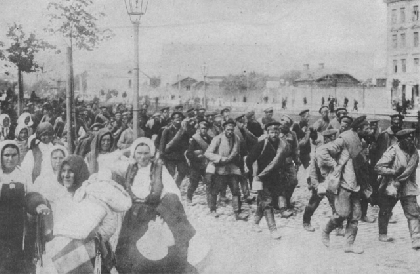Desertions in the Romanian Army in WWI
In a state of war, conscripted into a strict institutional form like the army, the military man is under great pressure

Steliu Lambru, 29.07.2024, 13:33
In a state of war, conscripted into a strict institutional form like the army, the military man is under great pressure. It’s about being alive or not, about the unknown, about consciousness. In the extreme experience of war there is also desertion, a practice that has always been encountered in human history. And, during the first world war or the Great War, soldiers of all armies deserted, and so did those of the Romanian army.
Historian Gabriela Dristaru from the “Nicolae Iorga” Institute of History in Bucharest researches the phenomenon of desertion from the Romanian army during the First World War. She looks at her research comparatively and, in doing so, has shown what is the attitude of British society today towards its own cases of deserters.
“In the English space, research on the subject began in the 1980s, with the declassification of documents subject to a longer classification regime in order to not affect the private lives of the accused and their families. Early texts argued that desertion during the Great War was not based on cowardice, as was believed at the time, but was the result of post-traumatic stress. Therefore, the 321 executions within the army of the British Empire were acts of injustice for which moral reparation was absolutely necessary.”
The Romanian army entered the First World War in August 1916. After a successful first offensive phase in the north and east, along the Carpathians, it was stopped by the German-Austro-Hungarian armies. In the south, the defeat of the Romanian army facing the Bulgarian-German one put the capital Bucharest in great danger. Following the battles for the defense of the capital, the city was occupied in December 1916, and the Romanian authorities took refuge in Moldavia, to the northeast. In 1917, the Romanian army, with the support of the French military mission led by General Henri Berthelot and the Russian army on the ground, managed to resist the German offensive in the battles of Mărăști, Mărășești and Oituz. The Bolshevik revolution in the fall of 1917 and the disintegration of the Russian army meant that Romania could no longer resist, and concluded peace in March 1918 with Germany and its allies.
Desertions appeared in the Romanian army after the fall of Bucharest and the retreat to Moldavia. It was a hasty retreat, chaotic at times, as we read in memoir sources. Romanian historians researched the army archives and compiled statistics. Until June 1, 1918, of the trials judged by the courts-martial of the various units of the Romanian army, two-thirds were about desertion and related crimes. Romanian military justice had been organized on the basis of the French Military Justice Code of 1857. In the law, desertion was of several types: desertion within the country, desertion within the country during wartime, desertion facing the enemy, desertion to the enemy, desertion in a foreign country. Disobedience to conscription and mobilization, insubordination, insulting superiors, and self-mutilation were also considered desertions in wartime. To better observe the phenomenon of desertion, Gabriela Dristaru read the court-martial archives of two large units, the 5th and 13th Divisions. Although the punishments for desertion were severe, ranging from death and stripping of rank, those who judged deserters were not hasty, and were lenient, as was the case with the 13th Division.
“Despite the fact that deserting within the country during wartime was punishable by hard labor for life or even the death penalty, only 3 sentences for hard labor for life and another 3 sentences for the death penalty were pronounced. The 6 who had received the maximum sentences had other charges: murder, robbery, forgery in public documents, insulting a superior. Percentage-wise, most sentences handed down for the crime of wartime desertion were acquittals.”
The reasons for the desertions were not escape from responsibility or fear, as one would think, but mostly emotional: longing for home, family, the desire to tell their loved ones that they were alive, the fear of leaving them under the occupation of the enemy. The vast majority of deserters returned to their units on their own after an absence of several weeks. Another reason for desertion was dissatisfaction with military and political leaders. Desertions were also numerous in 1917, encouraged by the defeatism of the Russian military and Austro-German propaganda. Here Gabriela Dristaru.
“Marcel Fontaine, a member of the French military mission, recalled that the opinion of the Romanian commanders was that the deserters were already too numerous to be executed, and the punishments would only have led to the worsening of the situation. In general, nothing could be done to change or improve the state of affairs. It was an assumed defeatism of the commanders, who felt and saw daily around them the disintegration of the Russian army and the imminent end of the war. The propaganda of the Central Powers had diversified and matured, and certainly contributed to the increase in the number of desertions from the Romanian army. The Romanian military authorities found a more pragmatic and effective solution: they replaced the mostly Wallachian divisions on the front line with divisions composed mostly of Moldavians, who had no interest in deserting to the enemy.”
Desertions from the Romanian army during the First World War were a typical phenomenon for those times. And the defectors of that time are left both with the judgment of their contemporaries and with the clemency of posterity.





























